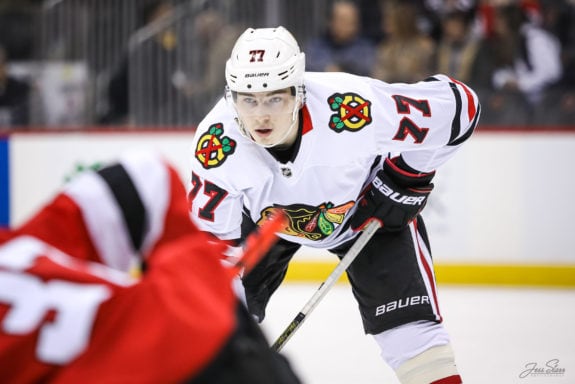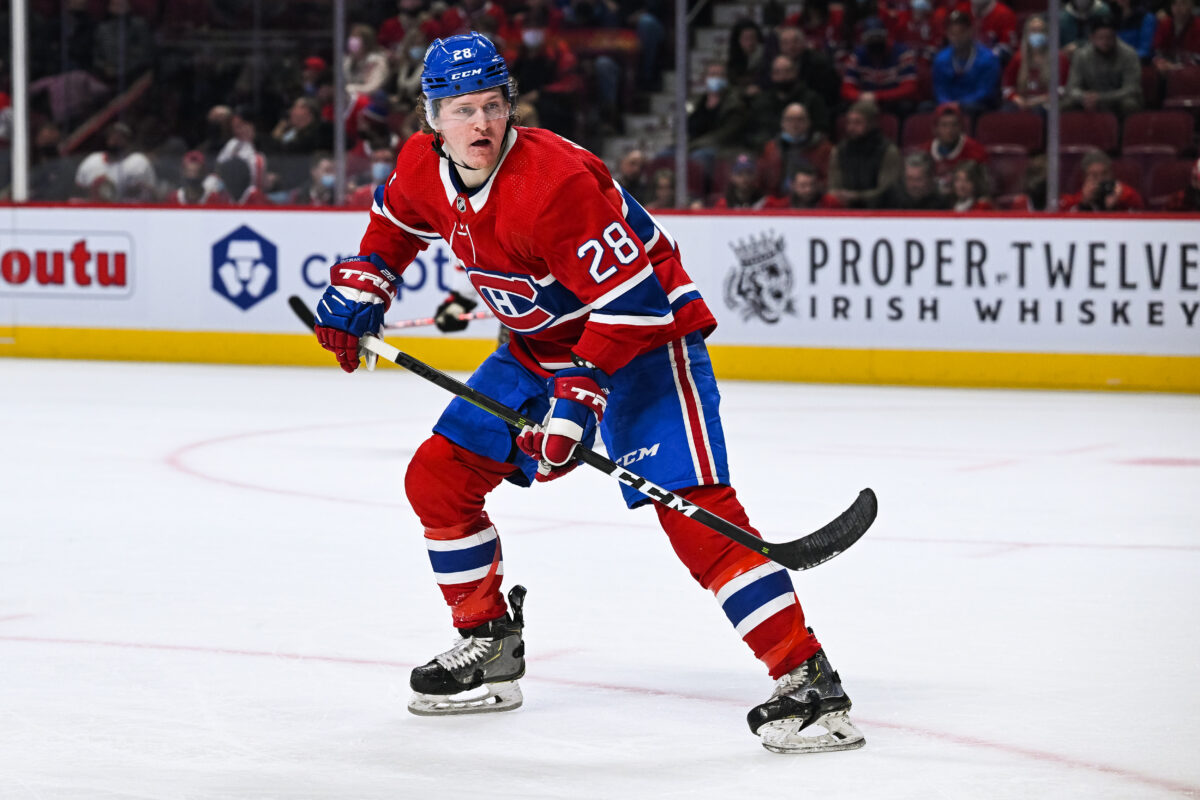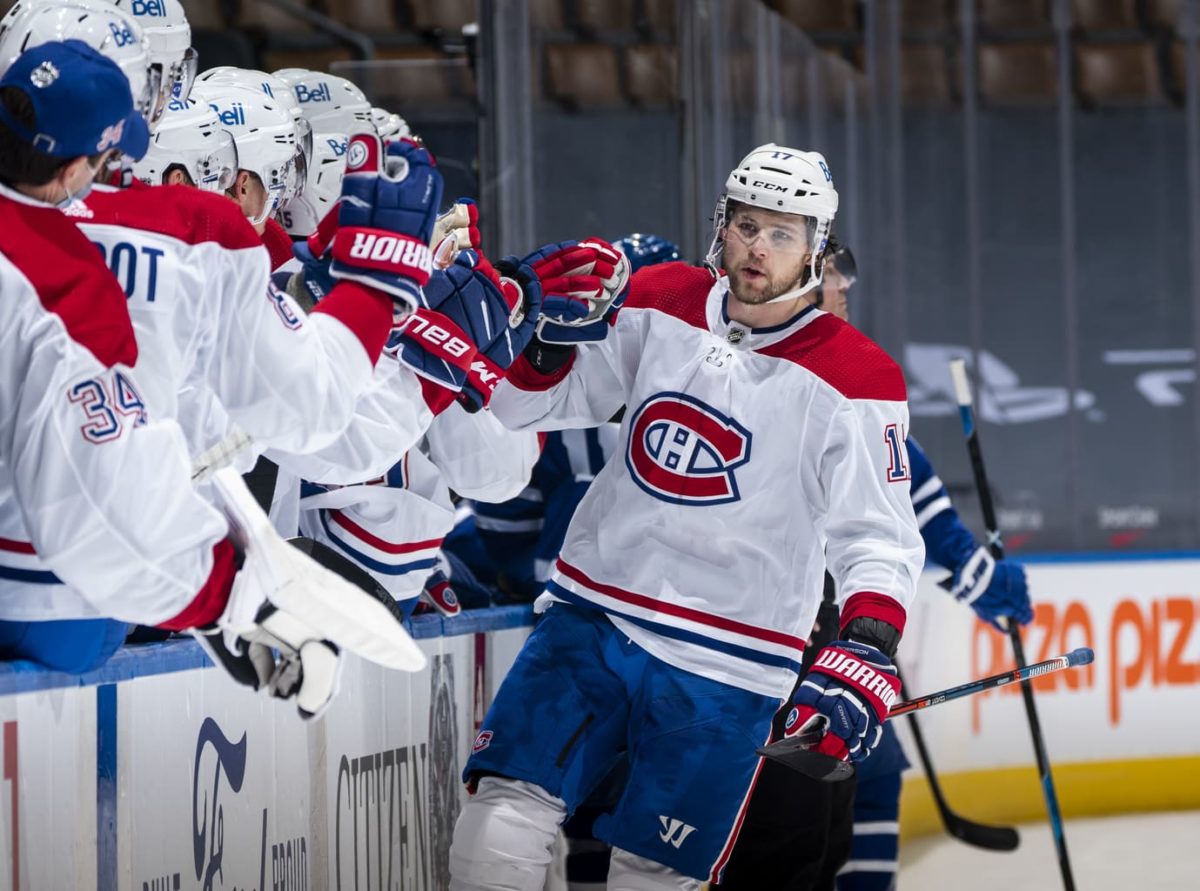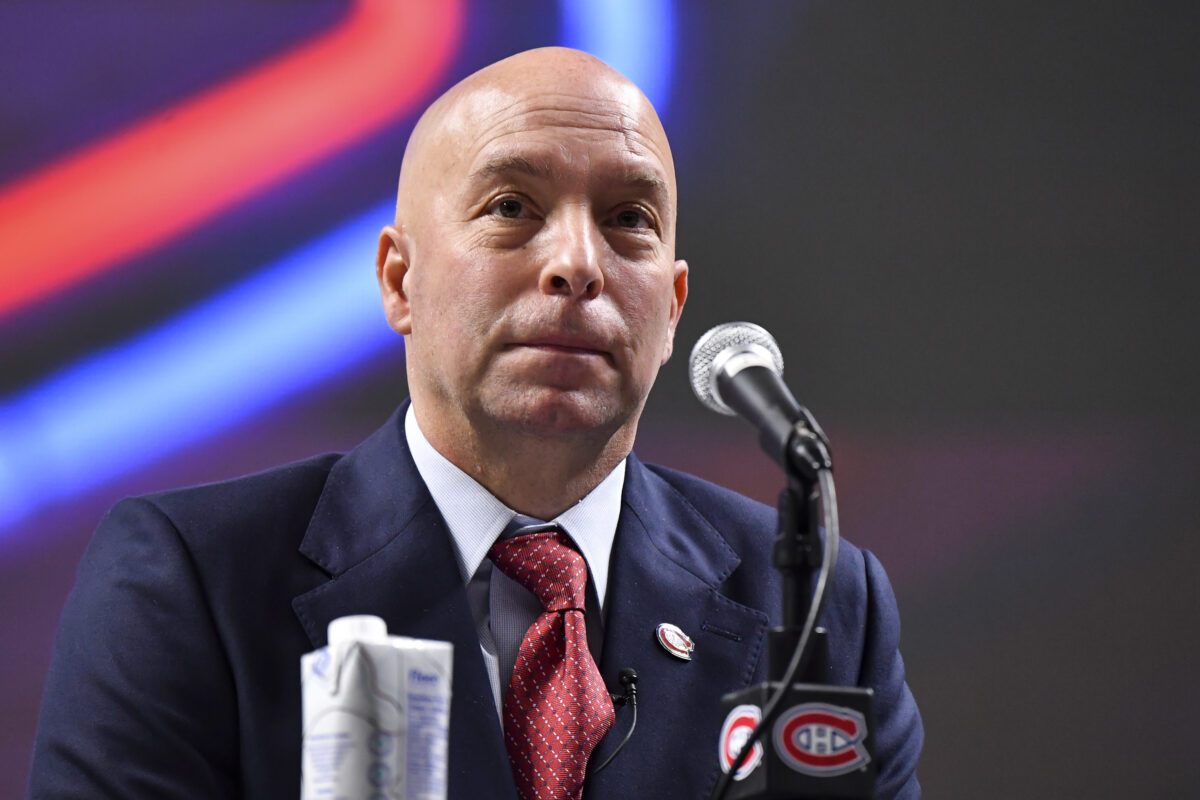The Montreal Canadiens are in a salary-cap bind, still having center Kirby Dach to re-sign as a restricted free agent. On the surface, it might make sense for fellow-center Christian Dvorak to be on his way out of town to make space, according to rumors. Nothing is further from the truth.
Canadiens Get Their Center in Dach
When Canadiens general manager Kent Hughes acquired Dach via trade at the 2022 NHL Entry Draft, it at least solved the mystery as to why they felt they could pass on centers Shane Wright and Logan Cooley to pick winger Juraj Slavkofsky first overall. It wasn’t a solution to the team’s lack of depth at center by itself, though.

Admittedly, there are ways in which trading for Dach was a better option. For example, he’s a high pick in his own right, at No. 3 by the Chicago Blackhawks in 2019. In a sense, Hughes (and executive vice president of hockey operations Jeff Gorton) got their cake and ate it too, with two top-three picks at the Draft, each addressing a separate need in the Canadiens’ lineup.
Dach’s also three years into his NHL career. So, he’s still young with a lot of potential, but more developed than either Wright or Cooley. However, in those three seasons, Dach has failed to establish himself as a center, with the Blackhawks moving him to the wing. It’s enough to give the typical Habs fan Alex Galchenyuk whiplash, with Dach earning a faceoff success rate of just 34.6% so far.
For his part, Galchenyuk had a 44.7% success rate over his first three seasons (45.3% over his entire Canadiens tenure), admittedly getting traded for a combination of factors. Meanwhile, Christian Dvorak had one of 51.5% over five seasons with the Arizona Coyotes. He also led the Habs at 56.7% last season.
Dvorak Brings Needed Experience at Center
Admittedly, there are no guarantees Wright or Cooley will pan out themselves. However, in the lead-up to the Draft, Wright, for example, was considered the safest pick available based on his projected floor as a second-line center. It remains to be seen how he is at faceoffs at the NHL level, but analysts know beyond a shadow of a doubt that Dach has trouble with them to say the least.
Considering the Canadiens have committed to this path going forward, giving up a young defenseman in Alexander Romanov to get Dach, they’ve also committed to helping the forward develop. That rationally means keeping a guy like Dvorak around to further show him the ropes, with no other regular Habs center so much as hitting 50% in faceoffs last season.

In fact, even at just 26, Dvorak is the team’s elder stateseman down the middle for all intents and purposes. Jake Evans is the same age, but a few months younger for the record and far from what you would call a grizzled veteran with experience from which to draw. Ditto for Nick Suzuki at just 23. Can the Habs really afford to trade Dvorak as a pure cap dump, without anyone similar coming back to Montreal?
Ultimately, Dvorak is not the redundancy some are making him out to be. The argument to keep him in the fold is a reflection of just how badly the Canadiens had to address their needs at center at the Draft. Maybe they did with Dach, but, even if the Canadiens know with 100% certainty that he will pan out as the pretty special center into which Hughes told the media he hopes the young forward develops, they’d still need Dvorak.
Maybe Dvorak isn’t the second-line center many, including ex-GM Marc Bergevin, thought the Canadiens were getting. However, he is an adequate middle-six one after scoring 33 points in 56 games last season, at a career-high 0.59 point-per-game pace.
That does mean Dvorak’s value is fairly high, especially with three seasons left on his deal at a respectable $4.45 million cap hit. However, all that really means is the Habs, because of their cap issues, should seriously consider keeping cost-effective deals like his, as they are in little danger of becoming an issue down the road.
The Case for Canadiens to Trade Anderson
Ideally, the Canadiens would trade Paul Byron or Evgeny Dadonov, who are pending unrestricted free agents (UFA), or Mike Hoffman, who hasn’t proven himself to be the boon to the power play the Canadiens so badly need. However, there may not be takers for any of those deals, at least not before the next trade deadline and especially not heading into the season, when teams are still figuring out their rosters and own cap situations. Similar for Jonathan Drouin, who makes for a decent target next trade deadline, once he’s had a chance to build up his value in a contract season.
Related: Likeliest Canadiens to Be Dealt for Cap Space After Weber Trade
As a result, the Canadiens may have to consider trading Josh Anderson, who meets all the necessary criteria:
- Large cap hit ($5.5 million)
- In high demand across the NHL
- Under contract until 2027, at which point he’ll be 33 and likely in decline
Obviously, there’s no disputing Anderson is a valuable asset. As a power forward capable of scoring 20+ goals in a season, the Canadiens could find a use for him in the immediate future, but how about in five years when the Canadiens would be looking to contend for the Stanley Cup?

Twenty goals are great. However, 20 can turn into 10 or less pretty quickly when you’re in decline, with Anderson missing 10 games or more in three of the last five seasons. Plus Anderson is a less-than-perfect fit alongside Suzuki and Cole Caufield, which is logically why the Canadiens drafted Slafkovsky in the first place.
If you’re not going to play Anderson on the top line, the $5.5 million cap hit works against you eventually. Eventually is now. Ultimately, all due respect to Anderson, he’s now the redundancy, not Dvorak.
The argument may be you cannot have too many power forwards. So, no, Hughes may not trade Anderson. However, he would be one player the Canadiens easily could, for whom they would get something valuable in exchange, as opposed to potentially having to give up an asset to get someone to take an unwanted hit off their hands.
Dvorak vs. Anderson
Simply put, there is a good chance Anderson ends up a bottom-six forward by the time his deal ends, in which case he would be a hindrance. See Milan Lucic, who was 33 this past season and literally 12th among Calgary Flames forwards in average ice time, as one example. There’s no such risk with Dvorak, who has a critical role down the middle to play before his contract expires in 2025. If it comes down to him and Anderson, it’s clear which one should be traded.
In fairness, no one necessarily wants to see Anderson go, but this team simply isn’t built to take advantage of all he has to offer in the window in which he can realistically offer it. Hughes undeniably inherited a team in dire straits from a cap perspective, and part of cleaning up Bergevin’s mess is making hard decisions. Trading a fan-favorite in Romanov to get Dach and help shore up the center position was one of them.

The fact the Canadiens are where they are in terms of the cap is proof positive GMs are not infallible. Mistakes get made, and while acquiring Anderson for Max Domi may not have been one on the part of Bergevin, neglecting to trade him before it’s too late can be one of Hughes’. It just so happens now is the perfect time to kill two birds with one stone.
In contrast, unless it’s at the 2025 trade deadline, before he becomes a UFA, there is no right time to trade Dvorak. Give credit it where it’s due. The whole Jesperi Kotkaniemi saga should have been handled better, but at least Bergevin did acquire a serviceable center in Dvorak. Considering they’re in short supply in the organization, Dvorak should be safe. Effectively an insurance policy at center, it’s one payout that gets better for the Habs with time. Much like with Dach, patience is key.